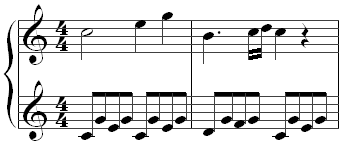Classical period (music) - Simple English Wikipedia, the free encyclopedia
This article does not have any sources. (October 2019) |
The Classical music period is the time from about 1750 to 1820 when Haydn, Mozart, Beethoven, and Schubert were the most famous living composers.
We often talk about “classical music” meaning European music which is not pop music or jazz or folk music. It is music which has been written by composers who have studied the art of composition. The article Classical music talks about classical music in this sense.
This article is about “Classical music” in the late 18th century and the early 19th century. The word “classical” is often used to refer to the arts of Ancient Greece and Rome. It has also come to mean any art form which has become very famous and is remembered for centuries afterwards. In music the Classical period comes between the Baroque and the period of Romanticism.
In some ways Classical music is often simpler than the music of the Baroque composers. There is often a tune with a simple accompaniment using broken chords called an “Alberti bass”. For classical composers the form of the piece was very important. Composers started their work with a tune (theme) and this tune would be developed in different ways: put in different key, changed from a fast to a slow tune, changed from major to minor or from minor to major.

Some of the most famous composers of the Classical period in music are:
- Carl Philipp Emanuel Bach (1714–1789)
- Christoph Willibald Gluck (1714–1787)
- Joseph Haydn (1732–1809)
- Luigi Boccherini (1743–1805)
- Muzio Clementi (1752–1832)
- Wolfgang Amadeus Mozart (1756–1791)
- Jan Ladislav Dussek (1760–1812)
- Ludwig van Beethoven (1770–1827)
- Franz Schubert (1797–1828)


 French
French Deutsch
Deutsch